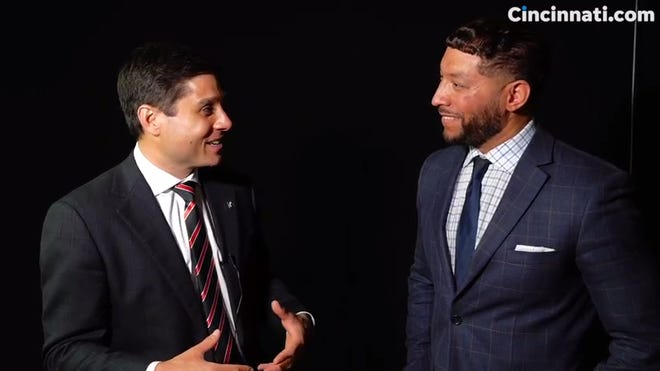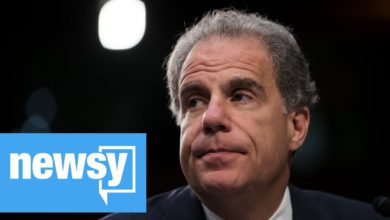
After six years working at a rental car company at the airport, Dayne Burns approached his 30s longing for a change.
So, it felt like fate in early 2021 when he saw Morehouse College in Atlanta was offering online classes. In promotional materials, the school touted its mission to serve prospective students like Burns, one of the millions of Black men in America who started college but never graduated. Beyond offering a degree, Morehouse was offering a second chance.
“To help more men like you transform into the leaders they were meant to be, we’ve created an empowering, affordable educational experience that’s accessible from anywhere in the country,” said the Morehouse Online website.
For Burns, the opportunity to complete his studies at one of the nation’s top historically Black colleges and universities from his home in South Carolina felt like a way “to turn everything around.”
After being accepted, the setbacks started quickly and kept coming. Burns learned the advertised computer science degree wasn’t ready. Only after starting classes did he discover that about half his college credits had not transferred, making him a freshman when he expected to be almost a junior. Confusion about the financial aid process led to Burns and others being dropped from classes a few weeks into his summer term.

Provided by Dayne Burns
After a year in the program, with the computer science degree yet to launch, Burns decided he was done.
“This was a cash grab. I feel like they saw an opportunity and they knew that they could leverage their name,” Burns said. “One day, if they take it serious enough, this program could be something. But right now they wanted to get by on ‘We’re Morehouse. Give us your money. And we’ll figure out the rest.’”
Burns’ frustration is with Morehouse, but the school isn’t solely responsible for the program. Morehouse Online is a partnership between the 156-year-old institution and 2U, a for-profit education tech company that helps operate degree programs at institutions including Yale; University of California, Berkeley; and Emerson College.
Online program managers, of which 2U is among the most prominent, offer an enticing service for colleges looking to boost their enrollment numbers or add offerings because they take on much of the upfront work and cost of building an online program. The arrangements could be particularly alluring for HBCUs, which studies show have been chronically underfunded compared to other colleges.
In return for footing the upfront costs, the company also at times keeps a majority of the revenue. Under its agreement with Morehouse, 2U receives 60% of the program’s revenue for up to a decade, according to the college.
Concerns over online program managers have been building for years. Critics say the revenue-sharing model incentivizes both partners to push for higher enrollment than a university can serve. Online program managers have less federal oversight than colleges, which education advocates say leaves them free to prioritize profits over student success.
The U.S. Education Department in February moved to expand the definition of third-party servicers to include companies such as 2U, a step that would require universities to disclose when they work with online program managers and subject them to further regulations. 2U is suing to block the expanded definition, saying the label has traditionally applied only to parties involved in financial aid. The department is considering revisions to its guidance.
Morehouse is the only all-men’s historically Black college in the country and counts among its graduates Martin Luther King Jr., director Spike Lee and numerous congressmen and Cabinet secretaries. In launching the online program, the school and 2U offered returning students the opportunity to join that elite brotherhood and “become a Morehouse Man” — for roughly half the price of an on-campus degree.

Mike Stewart, AP
More than 5,000 people inquired about the program within three days of the February 2021 announcement, a school official said at the time. Morehouse Provost Kendrick Brown told USA TODAY that the school had expected to enroll fewer than 100 online students that first year. Faced with such high interest, it accepted twice that number in the first semester alone.
Morehouse and 2U have struggled to meet the demand, leaving students to pay the price. The school and 2U advertised the computer science major that caught Burns’ eye, only to shelve plans for the degree months later. Morehouse had intended to launch up to six majors within two years, but still offers just one: business administration.
Even then, the school has yet to develop all the classes for that program and is filling in the gaps by sending students to other schools. One Morehouse adviser is responsible for all of the program’s students.
Current and former Morehouse online students who spoke with USA TODAY largely said they chose to share their frustrations because they support the college, believe the online program has potential and want to see improvements for future students. Even many with complaints praised the quality of the classes and said they have made meaningful connections with fellow students. Some students said the program has met their expectations.
“I’m happy I did it, and I’m going to stick through it and see it forward. I think it’s amazing, the platform for learning about my own culture and learning about myself,” said Teddy Dukuly, a 32-year-old clerical associate at the New York City Department of Environmental Protection. He cited a class on the history of Black entrepreneurship as particularly rewarding.
But many students also described persistent problems and setbacks, including some that mean it could take them longer and cost more to graduate than they had planned.
Last month, more than three-dozen online students signed a letter to Morehouse administrators saying that they were “deeply concerned about a number of issues” such as limited class availability, “seemingly arbitrary” acceptance of transfer credits and a lack of student support including high turnover among 2U-assigned advisers.
The students asked for a meeting with administrators and a written plan to address the problems.
“We also ask that this plan give us a detailed sense — even if the ideas are not final — of where the online program is heading over the next 3 to 5 years with respect to projected enrollment, dedicated faculty and staffing, student support, degree program expansion and course offerings,” the May 8 letter says.
The following week, a few days after USA TODAY informed the school of its plans to publish this article, Brown acknowledged to online students in an email that the school’s entry into online learning has “progressed more slowly than initially planned.”

Provided by Morehouse College
The provost said the school always planned to roll out the program in phases but faculty had to adjust classes to “account for the non-traditional, degree-completion learning needs of Morehouse Online students.” He listed nine classes currently in development, four of them required for graduation. He has instructed the school’s records department to accept transfer courses from accredited colleges, he said, to fulfill those requirements.
Brown also said the school is hiring two program directors to support and advise students in the online program, and will launch a newsletter to keep students updated.
“I have appreciated the grace many of you have extended to us as we strive to continually meet your learning needs so that you can complete your education,” he wrote.
Christopher “Chip” Paucek, co-founder and CEO of 2U, praised the company’s partnership with Morehouse and said it is normal for colleges to launch programs that are still being developed. But he stressed that Morehouse alone enrolls students, decides when a degree should be marketed and develops the curriculum. He said 2U launched the program “on their timeline, with their approval.”
“It’s our job to support the students through the program,” Paucek told USA TODAY. “But you know, obviously, they control the development of the courses, they control the approval of the courses, they control the timeline of the programs. And in this particular case, are there challenges in setting up these programs? Of course. We stand behind our partner in trying to face those challenges.”
In a message earlier this week informing 2U employees of this impending article, Paucek said Morehouse Online was the college’s first entry into online learning and acknowledged that 2U has “much less experience with undergraduate education programs” — conditions that resulted in “some real operational challenges as the program was getting up and running.” Paucek also criticized news coverage of his company as a “predetermined narrative.” He said that generally both Morehouse and 2U are pleased with the program, “bumps aside.”
Morehouse and 2U officials both described the program as an innovative and, at roughly $14,000 for tuition annually, affordable way for Black men to finish their degrees. Students can go at their own pace, and most in the program are taking classes part time. So far, just over 600 men have been accepted and taken at least one class, with approximately 325 enrolled in the most recent semester, according to the college.
Some students told USA TODAY they never thought they would be a Morehouse Man at this stage of their lives. For others — those who started at Morehouse in their teens but didn’t finish — the online program is a chance to fulfill a long-stalled dream.
Paul Carr, 48, dropped out of Morehouse a few credits shy of graduating in 1997 but still considers his Morehouse classmates family. His children refer to his closest Morehouse brothers as “uncle.” He called the school one of the last places in the country where young Black men can learn “in a safe space, unapologetically, without being attacked for” their race or having to “apologize for being excellent.”
Carr recently skipped what would have been his 25-year class reunion because he wasn’t really part of that graduating class. Not finishing had always stung.
“I wanted to finish my degree and have integrity,” he said.
But two years since enrolling in Morehouse Online, that hope has been replaced by disappointment.
“I’m not done,” he said. “And I have no idea when I’m going to be done.”

On an earnings call the week after Morehouse Online was announced, Paucek stressed that 2U was aiming to get “better and faster” at launching new programs.
“You can see that in the case of an expectation of Morehouse to actually serve students this calendar year, even though we just announced it,” Paucek said on the February 2021 call. “If we can keep driving higher quality programs and get them rolling faster, that’s better for our schools, better for our students.”
Within Morehouse, some faculty worried the company and university were moving too fast.
Keith Hollingsworth, a business administration professor at the school, was chairman of a faculty committee that approved new courses.
He said some faculty initially had concerns about working with an outside company. But they ultimately approved the business administration degree in May 2021, about three months after Morehouse and 2U announced the program.
Meanwhile, the computer science degree languished in the university’s bureaucracy.
Hollingsworth said faculty members were surprised at the demand for the business degree and wanted to assess the quality of that program before launching another. They also worried about offering a second degree while business classes were still being developed.
The group ultimately sent the computer science proposal back to the computer science department for review.
“You cannot offer it if the faculty hadn’t approved it, and the faculty were still talking their way through it,” Hollingsworth said. “I don’t know how 2U felt about that, but it really didn’t matter. We cannot offer things that have not been approved yet.”
The lack of faculty buy-in didn’t stop Morehouse and 2U from continuing to promote the computer science degree. In marketing materials, they said the program would prepare students for “graduate studies or entry into the workforce as a computer science professional at the highest level possible.”
“You’ll be more than just a leader in computer science,” the school’s website said. “You’ll be a Morehouse Man.”
Students planning to study computer science said they didn’t find out the degree wasn’t available until they were about to begin classes in August 2021. Several students told USA TODAY that those who planned to enroll in the program were assured the major was still coming and that they could transfer when it launched.
“It was just really upsetting because you guys accepted me to do this,” Burns said. “And even when they realized they didn’t have the computer science program, they never stopped advertising about it.”
By September 2021, the school had added a disclaimer to its website that the major was “pending approval by the Morehouse College Faculty and Board of Trustees,” according to a digital archive of the program’s website. Soon, after advertising it for roughly six months, computer science was no longer mentioned.

Screenshot taken by USA TODAY
As the first students enrolled, the high demand and limited class options created a bottleneck. A Morehouse administrator notified students by email that some would likely see changes to their schedules.
“We are trying to maximize our course schedules based on the overwhelming response in registering in our new online program,” the official wrote. “With the increased response, we have found that our courses are filling up so we are trying to accommodate as many of you as we can.”
Kedric Benefield, a 47-year-old Morehouse Online student who lives near Atlanta and first attended Morehouse in 1993, said it has been unclear to many students what classes they need to graduate and when those classes will be available. From the start, he said, Morehouse did not lay out a clear “path to graduation” — a phrase multiple students used in interviews with USA TODAY.
Benefield persevered and is among the students nearing graduation in business administration in the program’s second year. But he has gotten there by taking six classes at Atlanta Metropolitan State College, a neighboring public college, through a partnership Morehouse entered with the institution.
He plans to take two of his last three classes at the Indiana Institute of Technology and Wesleyan College, a small women’s college in Georgia, through another partnership Morehouse forged in April with an online course-sharing platform. In an email to students, the school said the option would allow them to “graduate in a timely fashion.”

Dustin Chambers for USA TODAY
“What’s really disappointing to me is my last … classes that I need for graduation won’t be from Morehouse,” Benefield said. “The one degree that you’re offering, you don’t have the classes.”
Brown, Morehouse’s provost, told USA TODAY that the first seven students graduated from the program last month. Brown said the school hopes to roll out two additional majors in the next academic year.
As for the computer science major, Brown said it is not atypical for a program to be promoted ahead of final approvals, “especially when approval appears to be imminent.” But he said that ultimately the school wanted to “ensure the integrity” of the program and that faculty believed it wouldn’t meet the needs of non-traditional students.
Brown said the university tried to be forthcoming with students about the change in plans. He said the school apologized to students who signed up for the major and offered them refunds or the chance to enroll in the business administration degree.
“Morehouse is committed to delivering an exceptional educational experience and was therefore willing to forego offering a degree program to preserve the highest quality experience,” he said in a statement to USA TODAY.

When 2U launched in 2008, there were few prominent universities online and even fewer companies helping them translate in-person classes to digital spaces. It went public six years later after signing up nine academic partners — which the company says have multiplied to more than 185 today. It also acquired edX, a nonprofit focused on free online courses, for $800 million in 2021.
As 2U has grown, so have criticisms of the company.
Last month, graduates of the University of Southern California’s online master’s in social work sued the school, claiming its program, in partnership with 2U, is a degree mill. The suit alleges that the university has largely hidden 2U’s involvement.
Though 2U is not named in the suit, its legal counsel — Matthew J. Norden — told USA TODAY the company reviewed the lawsuit and its internal records and said the claims are completely “without merit.” In a statement, university spokeswoman Lauren Bartlett said USC has one accredited Master of Social Work program that is, “delivered through on-campus and online options.”
“We look forward to defending this matter in court,” Bartlett said.
Ashley Bell, a former professor at Arcadia University, said that when 2U set up a virtual physician assistant program for the school, the company pushed the college to accept 65 students, beyond the typical class size for such programs, then failed to deliver the resources needed to serve the extra demand.
“The quality of the program was simply not a concern to the (online program manager),” she said during public comments at the March Education Department listening session related to the agency’s proposed regulations.
At the same session, academic leaders also praised 2U. Helen Drinan, interim president of Pennsylvania’s Cabrini University, said working with the company has allowed her institution to recruit students in new markets, bringing in much-needed revenue. She said that Cabrini couldn’t have afforded to front the capital for online recruiting.
“We only pay for 2U’s services once we enroll and then reenroll students,” Drinan said. “We and 2U are together engaged in supporting persistence to graduation because it pays off for our students, for the university, and for 2U.”
Among the services 2U provides its partners are “student success” advisers — 2U employees who regularly check in with students in the program.
Two former 2U advisers told USA TODAY that despite what their job title implied, they often felt powerless to provide meaningful assistance to students. They said they mostly acted as go-betweens, connecting students with university departments, and as quasi-therapists to students struggling with personal challenges, a role for which they felt unprepared.
Because calls are recorded, they felt limited in how forthcoming they could be with students frustrated with their programs.
The former employees, who USA TODAY agreed not to name because they signed nondisclosure agreements with 2U, said the company in recent years increased its focus on hitting metrics goals, a shift one described as going from providing “whatever the student needs” to telling students what they need to keep them enrolled.
At times she told students more classes would be available from a university, she said, even if she did not know or believe that to be true. Students occasionally brought up taking a leave of absence from their studies. But even if the adviser felt that was in their best interest, she said she was required to follow guidelines and talking points aimed at keeping students enrolled.
The other past adviser said she was required to call students on leave as often as every 30 days, a practice she found “extremely invasive,” especially since some were taking time off for medical reasons.
“I would safely say it felt more and more like a call center,” she said.
As at a call center, 2U employees use software that alters their area codes to local numbers – a Georgia area code when calling Morehouse Online students. Employee emails end in online.morehouse.edu.
Several Morehouse Online students told USA TODAY they were unaware when they were dealing with 2U staff, and some only learned from reporters that advisers they believed worked for the college actually worked for 2U.
“Oh, wow,” Burns said. “That would explain why it felt like all of our student advisers were clueless themselves.”
In his email last month to students, Brown pointed out that 2U employees are not academic advisers and said students should contact Morehouse staff with any academic questions.
Paucek told USA TODAY the company has never hidden its role but that going forward it will recommend to its partners that employees identify themselves more clearly. He also rejected criticism that the company’s business model can lead to over enrollment, or that that is what happened with Morehouse Online. He said it takes years for 2U to receive a return on the investment of setting up a new program, and that only happens if students succeed.
“This discussion, it’s a little forest from trees,” he said. “We’re talking about a program that is 50% of the campus cost, creating access for people to attend one of the most important HBCUs ... in the United States. We hope it scales tremendously to help solve the problem. And we launched it on their timeline with their approval. And I think we did it pretty well.”
Jay Davis, a 44-year-old Morehouse Online student who lives in Los Angeles, said it often feels as though his 2U adviser is figuring out things about the program at the same time as he is — once with disastrous consequences.
A few weeks after he started classes in summer 2022, Davis said he got an email from the Morehouse financial aid office telling him to pay his balance due or be dropped. Davis, who believed that he had until the end of the term to pay, said his 2U adviser suggested the email was not a firm deadline.
Davis missed the cut off. Soon after, he went to log in for a class and found he no longer had access. Burns told USA TODAY that he similarly was unexpectedly dropped during the summer 2022 term because of confusion over financial aid. A professor who taught Spanish that summer said that about half of his class was dropped because of the mix-up. Davis took the fall off to save money before reenrolling, an eight-month delay in his studies.
For Davis, who had dropped out of Dillard University — a small historically Black school in New Orleans — in 2000 after he ran out of money, the poor guidance he received from his 2U adviser was about more than lost time. “It was crushing,” he said.
“Your mind starts replaying what happened to you 20 years ago,” he said. “And all that doubt starts rising up to the top: ‘Oh, you know, this just wasn’t for you. You’ll never finish school.’”

When Morehouse Online students get fed up with the program’s growing pains, they often turn to one another for support through an online messaging group. Recently, the chat was flooded with students trying to piece together when classes they need would be available and venting about the school outsourcing courses to other institutions when they were promised a Morehouse education.
Benefield and others also formed a nonprofit to streamline communication with the university. The Morehouse Online Student Government Association in February 2022 sent a letter to the university administration outlining issues including the lack of course availability. In response, university officials held a town hall.

Provided by Fred Quinn
But Fred Quinn, 31, an online student who first attended Morehouse in 2009, said a university official also responded by telling the group to stop fundraising using Morehouse’s name after they had gathered donations to support students in need, such as those who had family members pass away.
“We clearly love the school,” said Quinn, who is transferring to another college this fall. “We want this program to succeed, but there are brothers who are suffering in this process, and that’s the last thing we need to come back to school to do.”
Many of the students’ earlier attempts to earn their degrees were waylaid by unexpected life events and the complexity of higher education. According to the U.S. Census Bureau, roughly 2.2 million Black men in America have some college credits but no degree. Morehouse and 2U officials stressed the desire to serve this demographic when they articulated their vision for the program.
Quinn said he failed to finish his first time at Morehouse when he missed a financial aid deadline following his grandfather’s death in 2011 and returned from the funeral to find his belongings in the hallway outside his dorm room. Another student has taken classes for years at various institutions during breaks in military service but never had the time to fully commit to finishing a degree. Others said they became overwhelmed by the academic rigors and bureaucratic hurdles of higher education when they first enrolled.
Carr, the online student who was a few credits shy of graduating from Morehouse College in 1997, left school when his girlfriend became pregnant. He planned to take a one-semester break. Then life picked up the pace — marriage, two more kids, a career — and one semester stretched into 24 years.
Carr found success without a degree thanks to his grandmother, who started homes for at-risk youth and adults with mental illnesses in Detroit, a family business he now helps operate. But Carr never gave up on graduating.
When Morehouse announced its online degree completion program, it seemed like a perfect fit. Carr assumed he would be able to complete the political science degree he had started in 1993, especially given assurances by both Morehouse and 2U staff that more majors would be added.
“I kept getting pitched that the political science department would be coming later, ‘So just hold tight. Meanwhile, take these classes.’ And so that’s what I did,” he said.
That included paying for a class that Carr said he was later told he shouldn’t have been enrolled in because he had taken an equivalent class during his time on campus.

Provided by Paul Carr
Carr said it wasn’t until he was well into the program that he realized a political science degree likely wouldn’t materialize soon. If it doesn’t, most of his political science credits do not apply to the business administration degree he is enrolled in, so it could take him at least another year and a half to finish.
In November — about 15 months after he started the online program — Carr said leaving Morehouse for a second time wasn’t an option. He had accepted that he and his fellow students were the “beta testers” and hoped his struggles, no matter how long it took him to graduate, would pave a smoother path for future students.
Since then, that resolve has started to weaken and Carr, who has taken out nearly $25,000 in federal student loans while in the online program, is questioning whether it is fair to himself to push through an incomplete program. Deciding what to do is agonizing because of how deeply he supports the mission of HBCUs and how much he wants to finally graduate from Morehouse — the only college he applied to in high school.
“I shouldn’t have to abuse myself and my time in order to accomplish things. … I think that that is a common theme for Black people, that has been placed on Black people in America, is that we have to suffer,” Carr said. “And I want to work diligently to move away from that narrative.”
Tricia L. Nadolny and Chris Quintana are investigative reporters at USA TODAY. Tricia can be reached at [email protected] or on Twitter at @TriciaNadolny. Chris can be reached at [email protected] or via Signal at 202-308-9021.
Source link








